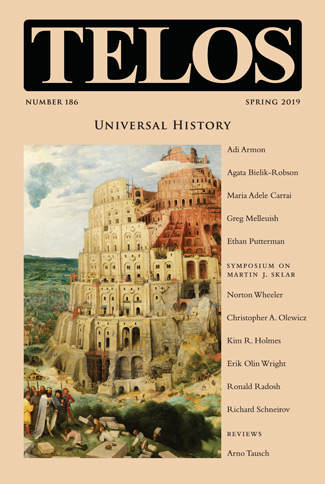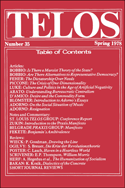Kim R. Holmes’s “A Man between Two Worlds: Assessing Martin Sklar’s Philosophy of Liberalism” appears in Telos 186 (Spring 2019), as part of a symposium on Martin J. Sklar. Read the full article at the Telos Online website, or purchase a print copy of the issue in our online store. Individual subscriptions to Telos are available in both print and online formats.
 Martin Sklar is an underappreciated thinker. The fact that he was a leading intellectual of the New Left in the 1960s and remained a self-identified leftist gave him a unique historical perspective. It enabled him to cut through many misunderstandings and clichés about the history of American liberalism, and gives us an opportunity to understand the left’s theory of community in a different light. One of Sklar’s central theses is his contention that the American system during the Progressive Era became a “mix” of capitalism and socialism. Looking at this background, one of Sklar’s more prescient theses is his distinction between the “broad left” and the “sectarian left.” This also informs his insightful idea of the “transvestiture of left and right”—that the left and right have largely changed historical places on ideas. The postmodern left is very different from, and indeed has largely broken off ideologically from, classic as well as mainstream liberalism as it has been understood in the past. One very important component missing from Sklar’s approach is religion. It must be recognized that the post-revolutionary construct in America helped ensure that the freedom of civil society as a liberal project could not fully flourish without the support of religion. Sklar’s work illuminates the great intellectual divide between classic liberalism and socialism, and between the moderate and radical Enlightenment legacies, which rest on two different views of human nature. However, if a choice had to be made between liberty and the dictates of community, Sklar always chose liberty.
Martin Sklar is an underappreciated thinker. The fact that he was a leading intellectual of the New Left in the 1960s and remained a self-identified leftist gave him a unique historical perspective. It enabled him to cut through many misunderstandings and clichés about the history of American liberalism, and gives us an opportunity to understand the left’s theory of community in a different light. One of Sklar’s central theses is his contention that the American system during the Progressive Era became a “mix” of capitalism and socialism. Looking at this background, one of Sklar’s more prescient theses is his distinction between the “broad left” and the “sectarian left.” This also informs his insightful idea of the “transvestiture of left and right”—that the left and right have largely changed historical places on ideas. The postmodern left is very different from, and indeed has largely broken off ideologically from, classic as well as mainstream liberalism as it has been understood in the past. One very important component missing from Sklar’s approach is religion. It must be recognized that the post-revolutionary construct in America helped ensure that the freedom of civil society as a liberal project could not fully flourish without the support of religion. Sklar’s work illuminates the great intellectual divide between classic liberalism and socialism, and between the moderate and radical Enlightenment legacies, which rest on two different views of human nature. However, if a choice had to be made between liberty and the dictates of community, Sklar always chose liberty.
 Norberto Bobbio’s 1978 article “Is There a Marxist Theory of the State?” marks a turning point in the history of Telos. The “red decade” was coming to a close in the mid-1970s, and the New Left was falling into disarray. Hence, Bobbio writes an epitaph in this 1978 article, which makes the convincing case that the Left was never able to develop a political theory that included a positive concept of the political state. In the years following Bobbio’s article, the Telos group would begin to look elsewhere. As Paul Piccone and Gary Ulmen later explained, “Telos‘ initial interest in [Carl] Schmitt’s work was triggered in the 1980s by the realization, in the collapse of the New Left and under the influence of Norberto Bobbio’s criticism, that the Left in general and Marxism in particular had no political theory.”[1] Bobbio moved Telos away from “revolution, dialectic, commodity fetishism, liberation, alienation, and monopoly capitalism”[2] to Carl Schmitt, federalism, and populism.
Norberto Bobbio’s 1978 article “Is There a Marxist Theory of the State?” marks a turning point in the history of Telos. The “red decade” was coming to a close in the mid-1970s, and the New Left was falling into disarray. Hence, Bobbio writes an epitaph in this 1978 article, which makes the convincing case that the Left was never able to develop a political theory that included a positive concept of the political state. In the years following Bobbio’s article, the Telos group would begin to look elsewhere. As Paul Piccone and Gary Ulmen later explained, “Telos‘ initial interest in [Carl] Schmitt’s work was triggered in the 1980s by the realization, in the collapse of the New Left and under the influence of Norberto Bobbio’s criticism, that the Left in general and Marxism in particular had no political theory.”[1] Bobbio moved Telos away from “revolution, dialectic, commodity fetishism, liberation, alienation, and monopoly capitalism”[2] to Carl Schmitt, federalism, and populism. 






